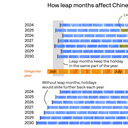Why holidays like Chinese New Year fall on different dates

Published Date: 2/9/2024
Source: axios.com
Data: Hong Kong Observatory; Chart: Will Chase/Axios
Saturday will mark the beginning of the Lunar New Year in China — a holiday that falls on different days each year, due to the use of different kinds of calendars.
The big picture: Hindu, Chinese, other Asian and Jewish people rely on lunisolar calendars to dictate important religious festivals as well as economic and government activities.
How it works: In the U.S. we're accustomed to the Gregorian calendar, which is based on the Earth's rotation around the Sun.
- Lunisolar calendars, however — the type that determine when events like Lunar New Year happen — work differently. They still account for the Earth's rotation around the Sun, but also the Moon's rotation around the Earth.
- Synchronizing the two types of calendars can be confusing.
Details: One year on a Gregorian calendar is 365 days, with a leftover "leap day" every few years.
- One year on a lunisolar calendar is 11 days shorter, and the difference gets rolled into leap months, rather than a leap day.
- That's why events like Lunar New Year can seem to move around a lot, when you try to map them onto the Gregorian calendar. (Next year's Lunar New Year will start 11 days earlier than this year's.) But on a lunsolar calendar, they fall consistently in the same season every year.
Go Deeper with a visual explainer on lunisolar calendars from the Axios Visuals team →